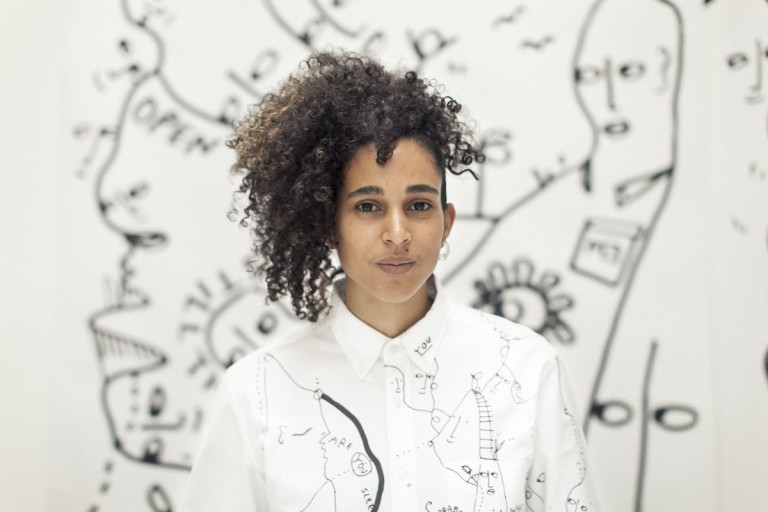In Conversation with Kia LaBeija: Using Positivity to Elevate Awareness, Acceptance, and Activism for HIV/AIDS
'In My Room', 2014, from the series '24'. Courtesy of the artist.
Kia LaBeija (she/her) born Kia Michelle Benbow, is a 25 year-old, Afro-Filipina contemporary artist who provokes awareness, acceptance and activism for HIV/AIDS through her portraiture and performance art. A native New Yorker, Kia has been living with the HIV virus since birth, and has witnessed her mother, activist Kwan Bennett, become a relentless fighter for the epidemic until her death in 2004. Considering herself a 'survivor' and not a 'victim', Kia forges on courageously, telling her story of a young, biracial, woman living with the disease in the 21st century. According to Kia,' Everyone has a story, and if you don't tell your story, someone else will tell it and they will tell it wrong'.
In her debut series '24', consisting of three large format self-portraits, the images are undeniably compelling, captivating, and layered with autobiographical elements of her life. The series is part of the landmark exhibition, 'Art AIDS America', currently on view at the Tacoma Art Museum. Another facet of Kia's artistic practice is her dancing (having trained at Alvin Ailey and Juilliard), and being a voguer with the iconic House of LaBeija she is able to inspire and empower black and Latino queer youth in monumental ways. A graduate of The New School with a BA in the Arts, she continues to shape and destigmatize the conversation around HIV/AIDS through truthful, impactful, and though-provoking work. In conversation with Jasmin Hernandez, Kia shares aspects of her artistry, personal history and her passion for activism.
'Mourning Sickness', 2014, from the series '24'. Courtesy of the artist.
Gallery Gurls: In your series first series, ’24’, three deeply personal images tell the story of a young woman dealing with grief and loss yet it’s counterbalanced with vanity and glamour. What was your reasoning in combining all of these emotions?
Kia LaBeija: My series ’24’ is comprised of many elements. In terms of glamour - I wanted to express that women and girls who live with the virus are beautiful beyond belief and that no matter what society says, we are sexy and we deserve love. I have thought long and hard about the phrase “beauty lies within”, people say “its not what's on the outside, but what is on the inside that counts.”
"What happens when the world tells you that your insides are considered a deadly weapon? My portraits express the beauty and pain of women who live with HIV."
'Eleven', from the second installment of the ongoing series '24'. Courtesy of the artist.
'Eleven’ is laced with powerful metaphors and at the same time presents the reality of being an HIV positive female. Can you tell me more about the message behind this photograph?
I had conceptualized ‘Eleven” for about two years. It takes place in my doctors office, the same office I have spent 21 years of my life visiting. The man in the image is in fact my doctor and he is taking my blood in the photograph. This is my interpretation of how I see myself every time I sit on that slab. The red dress is my prom dress, it represents survival. A child who was expected to die before the age of 7, made it to her senior prom, graduated high school and has continued to beat the odds.
'Kia and Mommy', 2014, from the series '24'. Courtesy of the artist.
You’ve been involved in two Visual AIDS exhibits, ‘Ephemera as Evidence’ and ‘Party Out of Bounds’, respectively. How has being a member of this incredible institution impacted your career?
Visual AIDS really put me on. They have supported me and given me the platform to be heard. The team at VA is so amazing, loving and invested in providing positive artists with the tools to make an impact. In collaboration with Visual AIDS I have done many panel discussions, workshops, and gallery shows. Their work really makes a difference and I am so honored and blessed to be a part of that.
"I spent a lot of time growing up searching for an HIV/AIDS organization to work with, and when Visual AIDS came into my life, everything clicked."
'In Search of the Sweet Life', Kia LaBeija on Sugar Hill, 2015. Courtesy of the artist.
For your postcard ‘In Search of the Sweet Life’ for the current exhibit at Studio Museum in Harlem, what made you focus on a historical era in American black life as opposed to a more contemporary setting?
We cannot know where we’re going unless we know where we have been. I love history and I love to reimagine it. I focused on this narrative because of my own family history, my great aunts moving from Virginia to Harlem in such a crucial moment in time. It's also a way for me to keep this moment in my own lineage alive. This is how I honor my family.
'In My Gallery', 2014. Courtesy of the artist.
How has being a part of the legendary House of LaBeija changed your life? Have any personal rewards you’ve reaped influenced your activism?
The House of LaBeija has been a remarkable part of my life. It has allowed me to express myself through movement and connect with the brown and black queer community. I have been able to make my name through this iconic legacy house, and I have been able to do positive work by carrying this name. The personal rewards are simple. It may just be the ability to hear another person tell their story, and witness them come into their power. That's what keeps me motivated to continue my activism.
"The House of LaBeija has been a remarkable part of my life. It has allowed me to express myself through movement and connect with the brown and black queer community."
'Swan Lake', 2015. Courtesy of the artist.













